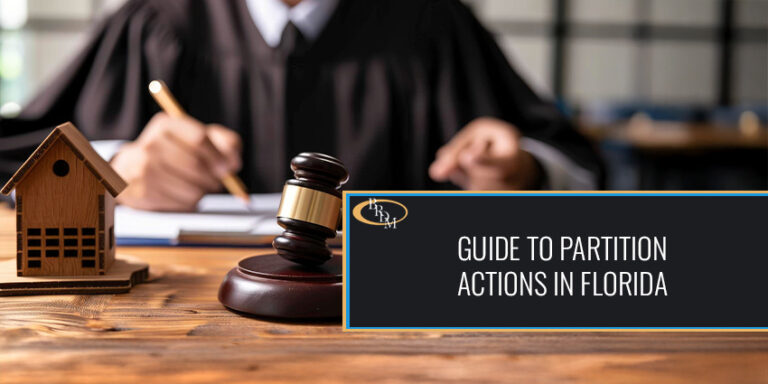What happens when two or more people own a property, but they can’t agree on what to do with it? In Florida, the legal solution is often a partition action.
At Battaglia, Ross, Dicus & McQuaid, P.A., we’ve helped many clients navigate this exact situation. Whether it’s former partners, business associates, or co-investors, a partition action can help resolve disagreements when emotions and money are involved.
This guide explains what a partition action is, who it’s for, how it works, and what to expect.
Table of Contents
- What Is a Partition Action?
- Common Situations That Lead to Partition Actions
- Who Can File a Partition Action in Florida?
- Types of Properties That Can Be Partitioned
- How Does a Partition Action Work?
- Example: Partition of a Home After a Breakup
- Example: Commercial Property Dispute Between Business Owners
- Can You Stop a Partition Action?
- How Courts Handle Disagreements About Expenses
- What to Expect in a Partition Lawsuit
- Pros and Cons of a Partition Action
- Frequently Asked Questions About Partition Actions
- How to Avoid a Partition Dispute
- Why Expert Guidance from an Attorney Matters
- Talk to Battaglia, Ross, Dicus & McQuaid, P.A. for a Free Consultation
What Is a Partition Action?
A partition action is a legal process used to divide real estate among co-owners who can’t agree. It allows any co-owner to ask the court to divide or sell the property.
Under Florida law, anyone who owns a share in a property has the right to file a partition lawsuit. You don’t need permission from the other owners to start the process.
Common Situations That Lead to Partition Actions
Partition actions aren’t just for one type of property. We’ve seen them in many real-life situations, including:
Unmarried Romantic Partners
Couples often buy a house together but never marry. If the relationship ends, things can get complicated. Who keeps the house? Who pays the mortgage? When emotions run high, a partition action can bring clarity.
Friends or Family Members
Sometimes friends or siblings inherit property together. Other times, they go in on a vacation home or investment property. When they stop agreeing, one may want out. A partition action can help split the asset fairly.
Business Partners
Businesses sometimes own real estate together. But if the business dissolves or partners fall out, the property needs to be divided. That includes office buildings, warehouses, or commercial land.
Investment Groups
Real estate investors sometimes pool money to buy a property. If the deal goes south or someone wants their money back, a partition action may be the only path forward.
In all of these cases, a Florida real estate attorney can help evaluate your options.
Who Can File a Partition Action in Florida?
Anyone who owns part of a property can file. You don’t need to own half. Even if you only own 10%, you still have legal rights.
Some key requirements:
- You must be a legal owner (on the deed)
- The property must be jointly owned with one or more people
- You must be unable to reach an agreement with the other owners
Note: If the co-owners are married, the matter usually goes to family court during divorce—not through a partition action.
Types of Properties That Can Be Partitioned
Partition actions in Florida can involve many types of real estate, including:
- Single-family homes
- Condos or townhomes
- Commercial buildings
- Undeveloped land
- Investment or rental properties
Our Florida real estate attorneys have worked with all types of property owners. We understand the unique issues each type can bring.
How Does a Partition Action Work?
Partition actions follow a clear legal process in Florida.
Step 1: File the Lawsuit
One co-owner files a complaint in civil court. It explains who owns the property and why a split is needed.
Step 2: Serve the Other Owners
All co-owners must be notified. They have the chance to respond, agree, or fight the action.
Step 3: The Court Decides the Method
There are two ways the court can divide the property:
- Partition in kind — The property is physically split between owners. This works best for land or multi-unit properties.
- Partition by sale — The property is sold, and profits are divided. This is more common, especially with single-family homes.
The court usually orders a sale when the property can’t be fairly divided.
Step 4: The Sale Happens
If the court orders a sale, the property is sold through a public auction or private sale. Proceeds are then split among the owners based on their share.
Step 5: Expenses and Credits
Before the money is divided, the court may adjust for:
- Repairs or improvements made by one owner
- Mortgage payments made by one party
- Property taxes or upkeep costs
A Florida real estate attorney can help you make sure you get credit for your contributions.
Example: Partition of a Home After a Breakup
Let’s say two people buy a house together as romantic partners. Both names are on the deed. Years later, they break up. One wants to sell, and the other refuses.
In this case, the person who wants out can file a partition action. The court will likely order the home sold and divide the proceeds. If one person paid most of the mortgage or repairs, they may get a larger share.
Example: Commercial Property Dispute Between Business Owners
Two business partners co-own an office building. Their business shuts down, but they can’t agree on what to do with the building.
One files a partition lawsuit. Since the property can’t be split, the court orders it sold. Each partner receives their share after debts and costs are handled.
These examples show how a Florida real estate attorney can protect your rights in emotionally and financially charged situations.
Can You Stop a Partition Action?
Sometimes. If all parties can come to an agreement, you may avoid going to court.
Options include:
- Buying out the other owner’s share
- Agreeing to sell the property voluntarily
- Creating a written agreement with clear terms
Courts often encourage mediation before trial. If both parties are willing, mediation can lead to creative solutions that keep you out of court. For example, you might agree to a structured buyout over time, or refinance the property in one party’s name.
But once the lawsuit is filed, it’s hard to stop unless everyone agrees. That’s why legal advice early on is so important.
How Courts Handle Disagreements About Expenses
In many partition cases, one owner has paid more toward the mortgage, property taxes, or repairs. These payments can become major points of dispute.
When the court orders a sale, it can adjust the division of proceeds to reflect individual contributions. For example, if one owner spent $15,000 on roof repairs, they may be reimbursed before the remaining profits are split.
But the court won’t assume anything. You’ll need detailed records—like receipts, invoices, and proof of payment—to show your investment in the property. A Florida real estate attorney can help you organize the right evidence and present it effectively.
What to Expect in a Partition Lawsuit
A partition lawsuit can take months to resolve. A real estate litigationtimeline depends on how complex the case is and how cooperative the parties are.
Here’s what you should expect:
- Respond to legal filings and court notices promptly
- Provide documentation of ownership, payments, and expenses
- Attend mediation if the court requires it
- Cooperate with appraisers, realtors, or court-appointed referees
- Be prepared for court if a settlement isn’t reached
Some cases settle quickly. Others go to trial. Costs include filing fees, legal fees, and possibly appraisal or sale costs.
Working with an experienced Florida real estate attorney can help move the process along and avoid costly mistakes.
Pros and Cons of a Partition Action
Here’s a quick breakdown:
Pros:
- Forces a resolution when talks fail
- Ensures you receive your share of the property
- Can credit you for expenses you covered
Cons:
- Can be expensive and time-consuming
- Might strain relationships further
- Property is often sold, even if someone wants to keep it
Frequently Asked Questions About Partition Actions
Can I force a partition if the other owner lives in the home?
Yes, but the case can be more complicated. Courts may allow the resident to stay temporarily or may require them to pay rent to the other owner.
How long does a partition lawsuit take?
It depends. Some settle in a few months. Others may take a year or more, especially if the property is hard to value or sell.
Will I get back what I paid into the house?
Possibly. Courts can reimburse owners who paid for mortgage, taxes, or improvements—but you must have documentation.
Can we sell the property ourselves without going to court?
Yes. A voluntary sale is usually faster and cheaper. But it requires everyone to agree and skilled Florida real estate attorneys.
How to Avoid a Partition Dispute
Good planning goes a long way. Before buying property with others, consider:
- Creating a written agreement outlining rights and responsibilities
- Deciding what happens if one person wants to sell
- Keeping records of who pays for what
You can avoid many disputes with a simple co-ownership agreement. A Florida real estate attorney can help draft one before problems arise.
Why Expert Guidance from an Attorney Matters
Partition actions can get messy. They involve personal conflict, large sums of money, and legal complexity.
Our Florida real estate attorneys understand the law and how to apply it. We know what judges look for. And we know how to gather the right evidence to protect your share.
We also understand the emotional side. We’ll walk you through your options and help you make informed decisions.
Whether you’re trying to resolve a dispute or prevent one, we’re here to help.
Talk to Battaglia, Ross, Dicus & McQuaid, P.A. for a Free Consultation
If you’re dealing with a real estate dispute, don’t wait. Talk to a Florida real estate attorney who understands your situation.
At Battaglia, Ross, Dicus & McQuaid, P.A., we’ve built a reputation for honest, smart, and practical legal help. Our team brings decades of experience in Florida real estate law.
We’ve helped property co-owners resolve disputes and reach fair outcomes—both in and out of court.
Here’s what you can expect:
- A free consultation
- Clear legal advice
- A plan based on your goals
- Personal, responsive service from a trusted team



